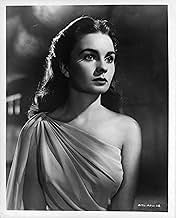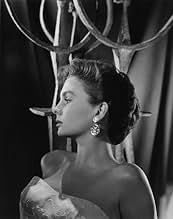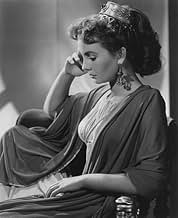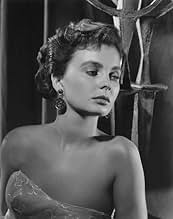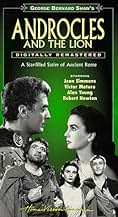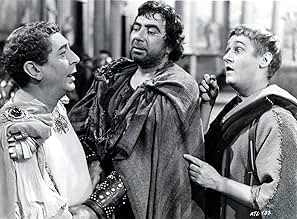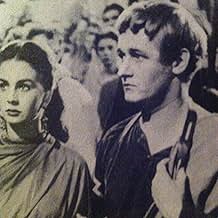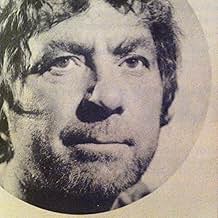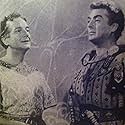CALIFICACIÓN DE IMDb
6.0/10
1.2 k
TU CALIFICACIÓN
Agrega una trama en tu idiomaStory of a Christian in ancient Rome who befriends a lion.Story of a Christian in ancient Rome who befriends a lion.Story of a Christian in ancient Rome who befriends a lion.
- Dirección
- Guionistas
- Elenco
Abdullah Abbas
- Gladiator
- (sin créditos)
Doris Barton
- Vestal Virgin
- (sin créditos)
Mary Bayless
- Christian
- (sin créditos)
Chet Brandenburg
- Christian
- (sin créditos)
Carol Brooks
- Vestal Virgin
- (sin créditos)
- Dirección
- Guionistas
- Todo el elenco y el equipo
- Producción, taquilla y más en IMDbPro
Opiniones destacadas
A famously bad movie of a minor Shaw play, Androcles and the Lion isn't bad so long as one doesn't approach it expecting a sparkling and witty adaptation along the lines of Major Barbara. To be fair to producer Garbriel Pascal, who loved Shaw's work dearly, and director Chester Erskine, an experienced theatre man, the play wasn't that good to start with. In trying to make their picture look like a spectacle, and casting hunky Victor Mature in a major role, Pascal and Erskine at least give the viewer something pleasing and familiar to look at. The presence of Jean Simmons doesn't hurt, either, though her padrone, studio chief Howard Hughes, was in the process of inadvertantly wrecking her American career with inferior movies.
In the roles as early Christians, Alan Young and Robert Newton make a terrific pair, and ought to have been co-starred again. Mr. Young's endearingly innocent, child-like and effeminate Androcles makes a fascinating contrast with Newton's bellowing, hyper-virile Ferrovius, and one wonders, if one adds to the mix the mere presence of Victor Mature, was going on subliminally in the minds of Pascal and Erskine when they cast this film. (Young fared far better with the animal kingdom some years later on television, as friend and companion of the irascible and unpredictable equine, Mr. Ed.)
In the roles as early Christians, Alan Young and Robert Newton make a terrific pair, and ought to have been co-starred again. Mr. Young's endearingly innocent, child-like and effeminate Androcles makes a fascinating contrast with Newton's bellowing, hyper-virile Ferrovius, and one wonders, if one adds to the mix the mere presence of Victor Mature, was going on subliminally in the minds of Pascal and Erskine when they cast this film. (Young fared far better with the animal kingdom some years later on television, as friend and companion of the irascible and unpredictable equine, Mr. Ed.)
G.B.S. declared in the lengthly "Preface" to this play, written years after its 1913 premiere (the "Preface is actually longer than the play itself), that he had written it in pique at the one J.M. Barry play he had ever thoroughly disliked - PETER PAN! The sentiment certainly sets a bench mark for measuring what Shaw may have accomplished in his charming, witty examination of a "Greek wizard" Christian (Androcles) who finds animals of all stripes and species more lovable and easy to get along with than his long (and vocally) suffering wife and neighbors.
It also may explain why Hollywood missed with this neatly produced filming despite a number of inspired casting choices (Maurice Evans as Caesar, Elsa Lanchaster as Androcles' wife & Robert Newton as the warrior/Christian, Ferrovius) and deft directorial touches.
In trying to focus on the "family friendly" (deadly words in the Hollywood lexicon) aspects of Shaw's charming satire, the film gives a bad case of the "cutsies" to the central role (it would have been interesting to see this Alan Young performance before he became so identified with his role, Wilbur, in TV's iconic MR. ED) and soft pedals or ignores most of the legitimately humorous byplay among his fellow Christians who wish martyrdom to wildly varying degrees and the infighting of the professional gladiators who echo (in somewhat more bloodthirsty fashion) the outrageous practicality of Captain Bluntschli in Shaw's early ARMS AND THE MAN.
Having made the decision to play the lion *as* a lion (before or after Harpo Marx departed the production?), the delicious hold on adult satire Shaw infused his play with was probably a lost cause, but what remains remains a very pleasant diversion worth a Saturday afternoon. For lovers of good Shaw however, it's more than a little watered down - perhaps most surprising of all, more watered down that the later equally enjoyable musical version Richard Rodgers and Peter Stone did for TV with Noel Coward as Caesar and Norman Wisdom as Androcles!
It also may explain why Hollywood missed with this neatly produced filming despite a number of inspired casting choices (Maurice Evans as Caesar, Elsa Lanchaster as Androcles' wife & Robert Newton as the warrior/Christian, Ferrovius) and deft directorial touches.
In trying to focus on the "family friendly" (deadly words in the Hollywood lexicon) aspects of Shaw's charming satire, the film gives a bad case of the "cutsies" to the central role (it would have been interesting to see this Alan Young performance before he became so identified with his role, Wilbur, in TV's iconic MR. ED) and soft pedals or ignores most of the legitimately humorous byplay among his fellow Christians who wish martyrdom to wildly varying degrees and the infighting of the professional gladiators who echo (in somewhat more bloodthirsty fashion) the outrageous practicality of Captain Bluntschli in Shaw's early ARMS AND THE MAN.
Having made the decision to play the lion *as* a lion (before or after Harpo Marx departed the production?), the delicious hold on adult satire Shaw infused his play with was probably a lost cause, but what remains remains a very pleasant diversion worth a Saturday afternoon. For lovers of good Shaw however, it's more than a little watered down - perhaps most surprising of all, more watered down that the later equally enjoyable musical version Richard Rodgers and Peter Stone did for TV with Noel Coward as Caesar and Norman Wisdom as Androcles!
George Bernard Shaw was hesitant about allowing his plays to be turned into movies. He was impressed with motion pictures, and frequently allowed himself to be in short subjects where he could reveal his current social theories. Shaw was probably the first major literary figure to leave several reels of film interviews. But he was aware of the liberties taken with literary properties turned into movies - particularly plays. Shakespeare had not fared too well in the movies up to the 1930s. Most filmed plays seemed cut up - the screenwriters, producers, and directors being concerned with time factors. Shaw did not trust his works in their hands.
Shaw found an above-average producer in Gabriel Pascal. Pascal loved Shaw's works and he went to see him. He admitted that he had little money but showed his devotion to Shaw's ideas. Shaw gave him a contract to produce all his plays. From 1938 to 1950 Pascal only produced three films but they were PYGMALION with Leslie Howard and Wendy Hiller, MAJOR BARBARA with Hiller, Robert Morley, Rex Harrison, and Robert Newton, and CAESAR AND CLEOPATRA with Vivian Leigh, Claude Rains, Steward Granger, and Flora Robson. They all remain memorable movies to this day. Although Shaw did complain of some deletions he was well served by these films.
In 1950 Shaw died, but his contract with Pascal was to last until Pascal died. However, Pascal only produced one last film, ANDROCLES AND THE LION. Produced by RKO it was the shortest of the Pascal movies, most likely due to the production standards and controls of RKO boss Howard Hughes. The casting was quite unique, in that the roles were played by pretty well known actors: Newton again, Alan Mowbray, Reginald Gardiner, Victor Mature, Jean Simmons, and Maurice Evans. Although Mature is stiff he gives a capable performance. Newton (not drunk here, like he was in BLACKBEARD) showed what a fine comic actor he could be. Witness the scene where he almost frightens Gardiner to death while explaining why he has become a changed man since he converted to Christianity. Maurice Evans, best recalled now as "Maurice" the father of Samantha on BEWITCHED, gave one of his three best lead parts (with his villain in KIND LADY and his Sir Arthur Sullivan in THE GREAT GILBERT AND SULLIVAN)as the philosophic Roman Emperor. Simmons lightens the film's love story with Mature. She always gave good performances. The interesting role in the film is the lead: Alan Young.
Young's career was taking off in 1952. He had started appearing on television in his own weekly variety/comedy program. He also was looking forward to other film roles. There would be another lead part in the now forgotten AARON SLICK FROM PUNKIN CREEK shortly afterward, and eventually nice supporting roles in TOM THUMB and (possibly his best performance) THE TIME MACHINE (1960). And then his role as Wilbur Post in MR. ED. Not a tremendous career but it got quite a bit of mileage in it, and it is still recalled fondly. He gives a nice performance as a soft-spoken, meek Androcles, who represents the truest spirit of Christianity of all the characters in the film (most of whom do not fully grasp the simplicity and quiet goodness at the heart of the faith). It does not hold center stage or attention in the movie (in fact it is forgotten while we concentrate on the antics of Newton's "muscular" Christianity or the Simmons/Mature romance or Evans' cat and mouse game with a courtier who happens to be a secret Christian, but also a political opportunist). But when Young turns up again, he does keep our attention in his scenes.
The result is an enjoyable film, but not of the standard of the three preceding ones. It would be the model (now that Shaw was dead, and soon after Pascal) of how the movies would treat Shaw's plays. The great dramatist was lucky that Pascal gave his all on those first three, for (except for the film of the musical version of PYGMALION - MY FAIR LADY) most of the remaining films of Shaw's plays (THE DOCTOR'S DELEMMA, THE DEVIL'S DISCIPLE, THE MILLIONAIRESS, GREAT CATHERINE) showed more of the cutting and rewriting - and usually inferior rewriting - that Shaw dreaded. Of the post-1952 films only THE DEVIL'S DISCIPLE and MY FAIR LADY hold up really well.
But there is one intriguing mystery about this film project. Pascal and Howard Hughes did come up with an odd casting of the lead role that was not seen to it's conclusion to the everlasting loss of motion pictures. Androcles was not originally cast for Alan Young, but for Harpo Marx. There were discussions with Harpo to play the role, and there may have been some actual footage shot for about a month, when Hughes decided it was not going to work out. Harpo was removed from the film, and Young got the role. Leaving a great hole in the story: what was the original film to be - was Harpo to perform his usual way (pantomime) or did he actually essay for the first time in his career to speak the lines. We don't know. While footage of lost movies occasionally turns up (such as Joseph Von Stenberg's I CLAUDIUS), most of these films that are jettisoned are destroyed. One hopes that Harpo's attempted performance was put on some film that has survived. It would be wonderful to see him in a talking role in a serious play by an English literary master. Harpo prided himself on his erudition and self-taught education He was a member of the Algonquin Circle with Kaufman and Hart, Alexander Woolcott, Edna Ferber, and Morris Ryskind. He should have made a fascinating figure as Androcles, but instead he was replaced. I safely feel it was our loss.
Shaw found an above-average producer in Gabriel Pascal. Pascal loved Shaw's works and he went to see him. He admitted that he had little money but showed his devotion to Shaw's ideas. Shaw gave him a contract to produce all his plays. From 1938 to 1950 Pascal only produced three films but they were PYGMALION with Leslie Howard and Wendy Hiller, MAJOR BARBARA with Hiller, Robert Morley, Rex Harrison, and Robert Newton, and CAESAR AND CLEOPATRA with Vivian Leigh, Claude Rains, Steward Granger, and Flora Robson. They all remain memorable movies to this day. Although Shaw did complain of some deletions he was well served by these films.
In 1950 Shaw died, but his contract with Pascal was to last until Pascal died. However, Pascal only produced one last film, ANDROCLES AND THE LION. Produced by RKO it was the shortest of the Pascal movies, most likely due to the production standards and controls of RKO boss Howard Hughes. The casting was quite unique, in that the roles were played by pretty well known actors: Newton again, Alan Mowbray, Reginald Gardiner, Victor Mature, Jean Simmons, and Maurice Evans. Although Mature is stiff he gives a capable performance. Newton (not drunk here, like he was in BLACKBEARD) showed what a fine comic actor he could be. Witness the scene where he almost frightens Gardiner to death while explaining why he has become a changed man since he converted to Christianity. Maurice Evans, best recalled now as "Maurice" the father of Samantha on BEWITCHED, gave one of his three best lead parts (with his villain in KIND LADY and his Sir Arthur Sullivan in THE GREAT GILBERT AND SULLIVAN)as the philosophic Roman Emperor. Simmons lightens the film's love story with Mature. She always gave good performances. The interesting role in the film is the lead: Alan Young.
Young's career was taking off in 1952. He had started appearing on television in his own weekly variety/comedy program. He also was looking forward to other film roles. There would be another lead part in the now forgotten AARON SLICK FROM PUNKIN CREEK shortly afterward, and eventually nice supporting roles in TOM THUMB and (possibly his best performance) THE TIME MACHINE (1960). And then his role as Wilbur Post in MR. ED. Not a tremendous career but it got quite a bit of mileage in it, and it is still recalled fondly. He gives a nice performance as a soft-spoken, meek Androcles, who represents the truest spirit of Christianity of all the characters in the film (most of whom do not fully grasp the simplicity and quiet goodness at the heart of the faith). It does not hold center stage or attention in the movie (in fact it is forgotten while we concentrate on the antics of Newton's "muscular" Christianity or the Simmons/Mature romance or Evans' cat and mouse game with a courtier who happens to be a secret Christian, but also a political opportunist). But when Young turns up again, he does keep our attention in his scenes.
The result is an enjoyable film, but not of the standard of the three preceding ones. It would be the model (now that Shaw was dead, and soon after Pascal) of how the movies would treat Shaw's plays. The great dramatist was lucky that Pascal gave his all on those first three, for (except for the film of the musical version of PYGMALION - MY FAIR LADY) most of the remaining films of Shaw's plays (THE DOCTOR'S DELEMMA, THE DEVIL'S DISCIPLE, THE MILLIONAIRESS, GREAT CATHERINE) showed more of the cutting and rewriting - and usually inferior rewriting - that Shaw dreaded. Of the post-1952 films only THE DEVIL'S DISCIPLE and MY FAIR LADY hold up really well.
But there is one intriguing mystery about this film project. Pascal and Howard Hughes did come up with an odd casting of the lead role that was not seen to it's conclusion to the everlasting loss of motion pictures. Androcles was not originally cast for Alan Young, but for Harpo Marx. There were discussions with Harpo to play the role, and there may have been some actual footage shot for about a month, when Hughes decided it was not going to work out. Harpo was removed from the film, and Young got the role. Leaving a great hole in the story: what was the original film to be - was Harpo to perform his usual way (pantomime) or did he actually essay for the first time in his career to speak the lines. We don't know. While footage of lost movies occasionally turns up (such as Joseph Von Stenberg's I CLAUDIUS), most of these films that are jettisoned are destroyed. One hopes that Harpo's attempted performance was put on some film that has survived. It would be wonderful to see him in a talking role in a serious play by an English literary master. Harpo prided himself on his erudition and self-taught education He was a member of the Algonquin Circle with Kaufman and Hart, Alexander Woolcott, Edna Ferber, and Morris Ryskind. He should have made a fascinating figure as Androcles, but instead he was replaced. I safely feel it was our loss.
This 1952 film was the first film version of a George Bernard Shaw play produced after the playwright's death, and the compromises are already obvious.
Shaw had had artistic control over three films produced from his plays-- the 1938 "Pygmalion", "Major Barbara" (1941) and "Caesar and Cleopatra" (1945), and his influence had clearly been felt, some would say for both good and bad. He had had absolute final say-so over the casting, and, after his experience with "Pygmalion", Shaw became somewhat more demanding and insisted that not a word be cut from both "Major Barbara" and "Caesar and Cleopatra", a decision that resulted in both of these excellent films being flops. "Androcles and the Lion" clocks in at less than two hours.
The casting suffers without Shaw's influence. Because this is an RKO release directed by Chester Erskine, a not especially distinguished American director, the cast features two American actors in major roles, and the clash between their style of acting, and that of the British actors who HAVE had experience with Shaw, is apparent. Some other American actors can be seen in bit roles.
In a blatant effort to court the average movie audience who wouldn't recognize a Shaw play if it hit them in the face, movie hunk Victor Mature (yes, the very same actor who appeared in "The Robe" and "Samson and Delilah") is cast in the somewhat demanding role of a Roman captain trying to understand the Christian martyrs. An actor like James Mason or Stewart Granger might have been perfect and would have had the necessary acting ability, but Mature, although apparently trying hard, comes close to wrecking the film and destroying its Shavian flavor. And he gets second billing!
Alan Young, whom most people will remember as Wilbur from the "Mr.Ed" TV series, is also American, but is a far better actor than Mature, and although his style sometimes seems as if it straight out of a sitcom rather than a Shaw play, Young does quite a good job in the all-important lead role of Androcles. But was it the Hollywood adaptors, or is it REALLY Shaw who gave the lion the endearing name of "Tommy"? Or is that just another sop to the movie-going crowd who loves animals with cute names?
The rest of the cast is just fine--Jean Simmons excellent, and not syrupy, as a devout woman willing to face martyrdom in the arena, Robert Newton, hilarious as a hulking strongman converted to Christianity who can barely be kept from singlehandedly demolishing his enemies, Noel Willman, Elsa Lanchester in the brief role of Androcles' wife, and, in his best screen performance, Maurice Evans (Dr. Zaius in the 1968 "Planet of the Apes") as the Roman emperor. They make this film exactly what it should be.
Shaw had had artistic control over three films produced from his plays-- the 1938 "Pygmalion", "Major Barbara" (1941) and "Caesar and Cleopatra" (1945), and his influence had clearly been felt, some would say for both good and bad. He had had absolute final say-so over the casting, and, after his experience with "Pygmalion", Shaw became somewhat more demanding and insisted that not a word be cut from both "Major Barbara" and "Caesar and Cleopatra", a decision that resulted in both of these excellent films being flops. "Androcles and the Lion" clocks in at less than two hours.
The casting suffers without Shaw's influence. Because this is an RKO release directed by Chester Erskine, a not especially distinguished American director, the cast features two American actors in major roles, and the clash between their style of acting, and that of the British actors who HAVE had experience with Shaw, is apparent. Some other American actors can be seen in bit roles.
In a blatant effort to court the average movie audience who wouldn't recognize a Shaw play if it hit them in the face, movie hunk Victor Mature (yes, the very same actor who appeared in "The Robe" and "Samson and Delilah") is cast in the somewhat demanding role of a Roman captain trying to understand the Christian martyrs. An actor like James Mason or Stewart Granger might have been perfect and would have had the necessary acting ability, but Mature, although apparently trying hard, comes close to wrecking the film and destroying its Shavian flavor. And he gets second billing!
Alan Young, whom most people will remember as Wilbur from the "Mr.Ed" TV series, is also American, but is a far better actor than Mature, and although his style sometimes seems as if it straight out of a sitcom rather than a Shaw play, Young does quite a good job in the all-important lead role of Androcles. But was it the Hollywood adaptors, or is it REALLY Shaw who gave the lion the endearing name of "Tommy"? Or is that just another sop to the movie-going crowd who loves animals with cute names?
The rest of the cast is just fine--Jean Simmons excellent, and not syrupy, as a devout woman willing to face martyrdom in the arena, Robert Newton, hilarious as a hulking strongman converted to Christianity who can barely be kept from singlehandedly demolishing his enemies, Noel Willman, Elsa Lanchester in the brief role of Androcles' wife, and, in his best screen performance, Maurice Evans (Dr. Zaius in the 1968 "Planet of the Apes") as the Roman emperor. They make this film exactly what it should be.
In reference to a previous comment, the Lion's name, Tommy, comes from the original text of Shaw's play at the end of Act II. Androcles also talks baby talk to the Lion while he is removing the thorn from his paw in the Prologue (or first scene) of the play. Also I think Victor Mature does a pretty good job as the Captain, although some might be put off by the clash of his accent and acting style with the rest of the mostly British cast. However, Mature's style is well suited to the no-nonsense, pragmatic officer trying desperately to save the patrician Lavinia from being sacrificed in the arena. He tells her to lie and recant her Christian beliefs if that is what it takes to save her life; then she can go home and believe whatever she wants. Mature's less polished acting style underscores his amoral pragmatism as well as his worldly desire for Lavinia. He is her temptation, her incentive the deny her faith. That she resists this demonstrates her dedication to her religion.
¿Sabías que…?
- TriviaAfter principal filming was completed, Howard Hughes decided the film needed some extra sprucing up. He had Nicholas Ray shoot a "Vestal Virgin Bathing Sequence" which immediately ran afoul with censors and enraged producer Gabriel Pascal, amongst others. The sequence was eventually deleted from release prints.
- ErroresThe Christians sing "Onward, Christian Soldiers" - a hymn published in 1871.
- Créditos curiososOpening credits prologue: ROME 161 A.D. IN THE REGION OF THE EMPEROR ANTONINUS
- ConexionesFeatured in It's Showtime (1976)
- Bandas sonorasOnward, Christian Soldiers
(uncredited)
Music by Arthur Sullivan
Words by Sabine Baring-Gould
Sung by the marching Christians
Selecciones populares
Inicia sesión para calificar y agrega a la lista de videos para obtener recomendaciones personalizadas
- How long is Androcles and the Lion?Con tecnología de Alexa
Detalles
Taquilla
- Presupuesto
- USD 1,250,000 (estimado)
- Tiempo de ejecución
- 1h 38min(98 min)
- Color
- Relación de aspecto
- 1.37 : 1
Contribuir a esta página
Sugiere una edición o agrega el contenido que falta

